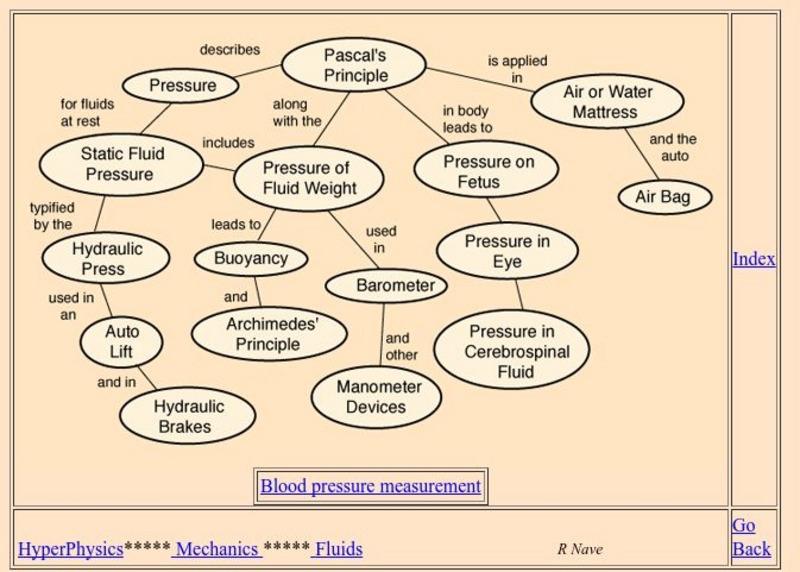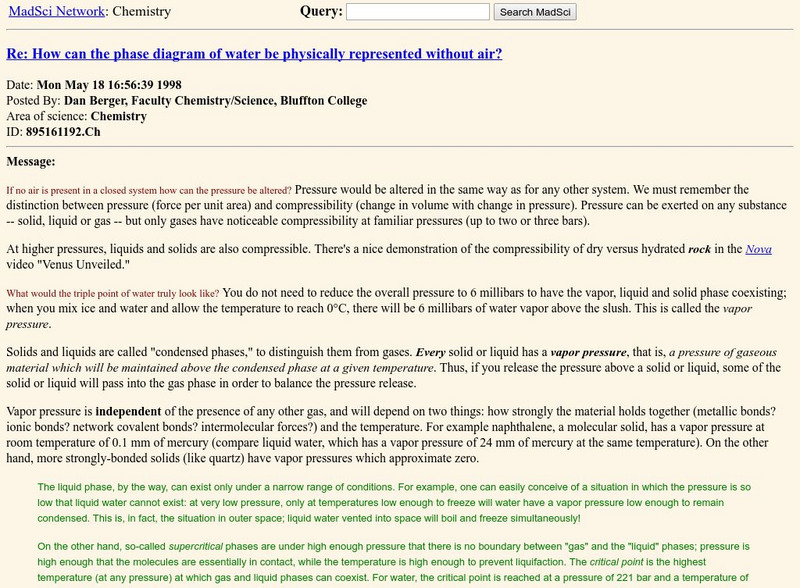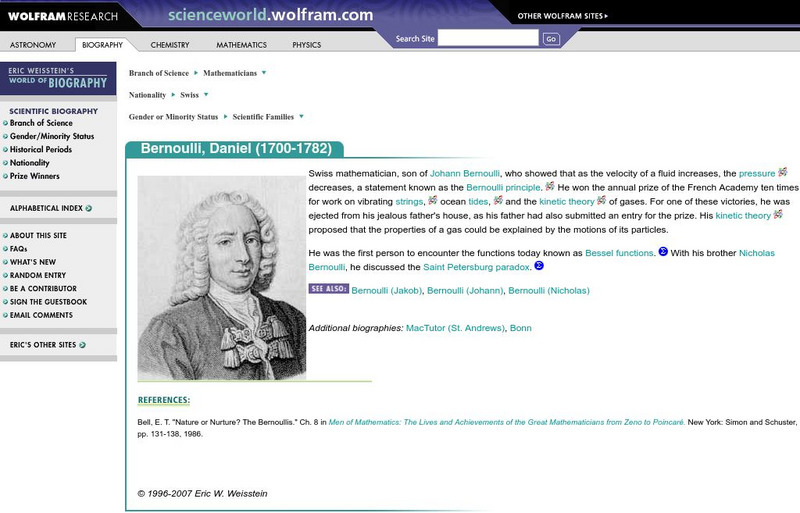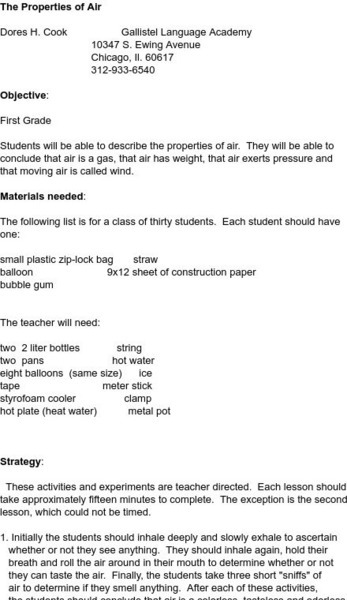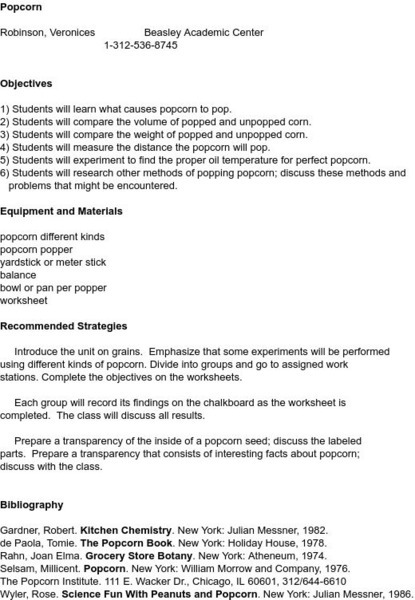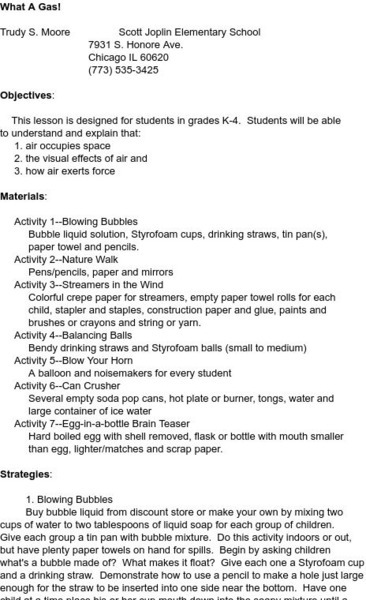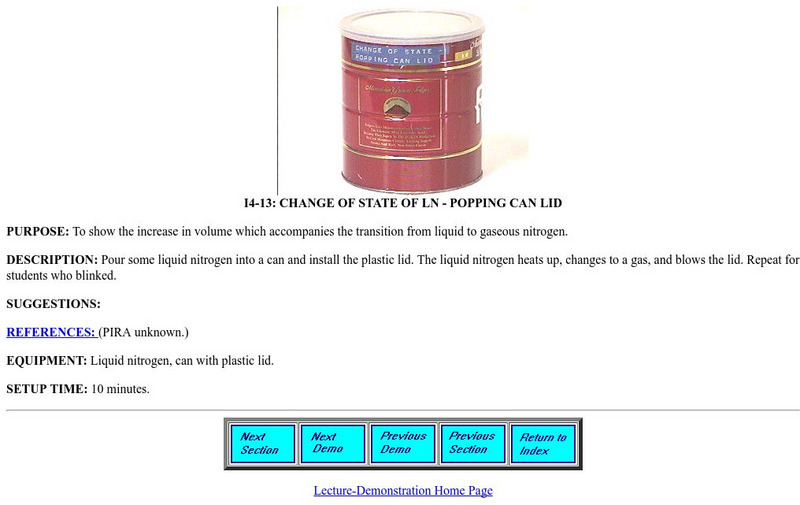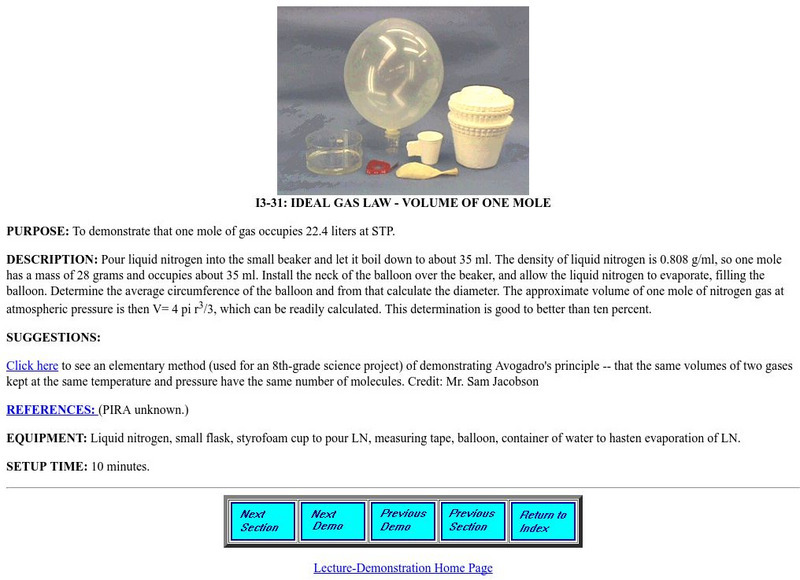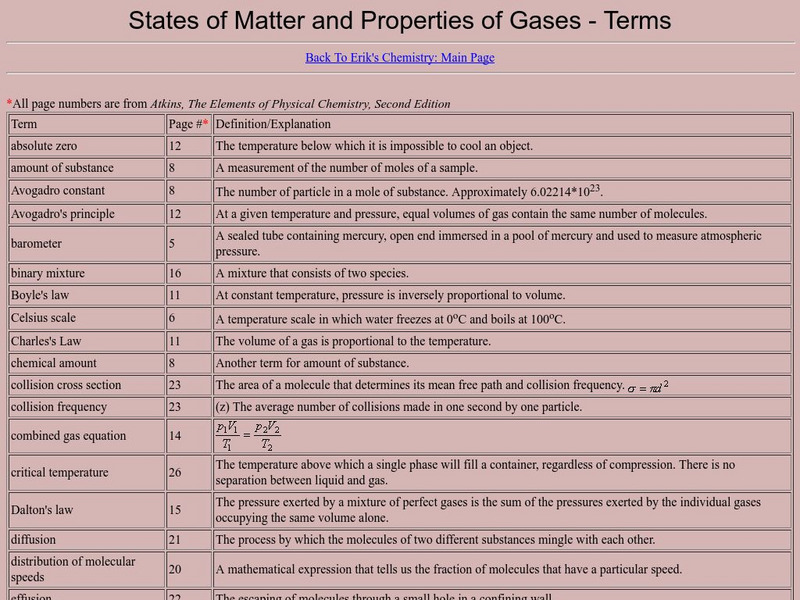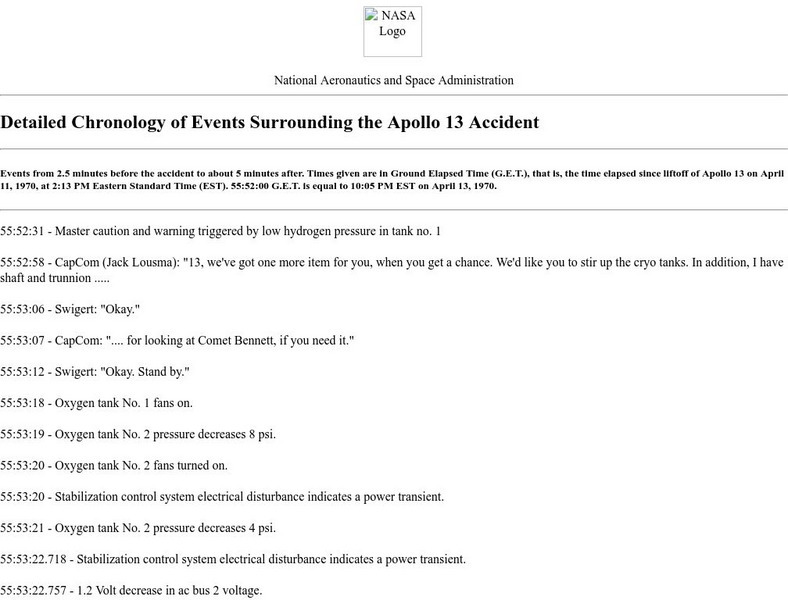Alabama Learning Exchange
Alex: Air Is All Around You
In this science lesson students will be asked the question, "Does air take up space?" and "Does air have weight?" Students will conduct experiments that prove that air has mass, takes up space, and exerts pressure.
South Carolina Educational Television
Know It All: The Properties of the Atmosphere
In this lesson, 6th graders will develop and use models to exemplify the properties of the atmosphere and the relative scale in relation to the size of Earth.
Georgia State University
Georgia State University: Hyper Physics: Pascal's Principle
This site from Georgia State University Department of Physics and Astronomy shows a diagram of the relationship of Pascal's Principle to other topics. Links to other topics.
MadSci Network
The Mad Scientist Network: Chemistry
The question: "What would the triple point of water truly look like?" is discussed and explained. The phases of matter are described.
Exploratorium
Exploratorium: Balloon Blow Up
Students can experiment at home with expanding balloons, dancing raisins, and pop cans that have been shaken up.
Physics Central
Physics Central: Physics in the Kitchen: The Magical Can Crusher
Students will see first hand the force that is created by pressure as a can crushes before their eyes. This demonstration will show students how a can will collapse due to pressure from the air outside pushing against the can's exterior...
Wolfram Research
Wolfram Science World: Daniel Bernoulli
This site from ScienceWorld provides a brief biography of Daniel Bernoulli's major scientific accomplishments, including Bernoulli's principle, vibrating strings, ocean tides, and the kinetic theory of gases. Links are included to...
Science and Mathematics Initiative for Learning Enhancement (SMILE)
Smile: The Properties of Air
Lesson plan to teach properties of air. Students use balloons, plastic bottles, plastic bags and a meter stick to conclude that air is a gas that has weight, exerts pressure, and moves.
Science and Mathematics Initiative for Learning Enhancement (SMILE)
Smile: Popcorn Is a Gas
From the Science and Mathematics Initiative for Learning Enhancement (SMILE) program. A lesson plan in which students explore the pressure-temperature-volume relationships by performing a popcorn lab investigation. Intriguing. Great...
Science and Mathematics Initiative for Learning Enhancement (SMILE)
Smile: Relationships: Pressure, Volume, and Temperature
From the Science and Mathematics Initiative for Learning Enhancement (SMILE) program. A lesson plan that centers around a lab investigating the gas laws of Boyle, Charles, and Gay-Lussac. Data is collected, analyzed and discussed.
Science and Mathematics Initiative for Learning Enhancement (SMILE)
Smile: What a Gas!
In this lesson plan, students will understand and explain that air occupies space, visual effects of air and how air exerts force.
University of Maryland
University of Maryland: Regelation: Ice Under Pressure
A page from the University of Maryland Physics Lecture Demonstration Facility. Provides directions for a teacher demonstration on the phenomenon of regelation. Shows apparatus and set-up; provides suggestions. Easily adaptable as a...
University of Maryland
U. Of Maryland: Change of State of Liquid Nitrogen
A page from the University of Maryland Physics Lecture Demonstration Facility. Provides directions for a teacher demonstration of the vaporization of liquid nitrogen. Shows apparatus and set-up; provides suggestions. Easily adaptable as...
University of Maryland
University of Maryland: Boiling Water by Pumping
A page from the University of Maryland Physics Lecture Demonstration Facility. Provides directions for a teacher demonstration which utilizes a Bell jar and vacuum pump to show the dependency of boiling point upon pressure. Shows...
University of Maryland
University of Maryland: Ideal Gas Law Volume of One Mole
A page from the University of Maryland Physics Lecture Demonstration Facility. Provides directions for a teacher demonstration of the ideal gas law. Shows apparatus and set-up; provides suggestions. Easily adaptable as a student project...
Wikimedia
Wikipedia: Gas Laws
This site from the encyclopedia Wikipedia provides a basic overview of the three gas laws (Boyle's, Charles', and Graham's Law) and information on the ideal gas law is found here.
PBS
Pbs Teachers: Make Some Zlime
Explore properties of matter by making a slimy substance out of cornstarch and water then noticing how it reacts to pressure.
Michael Blaber, PhD
Florida State University: Gases: Ideal Gas Equation
The ideal gas law is derived from the empirical gas laws. The ideal gas law equation of state is listed and discussed. The universal gas constant is explained and its value is listed in five different sets of units. Standard temperature...
PBS
Pbs Teachers: Under Pressure
Investigate the effect a dam's shape plays in its ability to withstand a load, the water pressure acting on it. Determine the difference in the compression rate at the top of a dam with that at the bottom.
Discovery Education
Discovery Education: Physical Science
The Discovery Channel provides numerous lesson plans dealing with the physical sciences. Content is organized by grade level, but all lesson plans include suggestions for adaptations for older or younger audiences.
Other
The Science House: Floating Candles
In this experiment students observe a combustion reaction and deduce the components necessary for the reaction to occur. They also see the relationship between pressure, volume, and number of molecules for gases.
Other
States of Matter and Properties of Gases: Terms
A very complete list of terms that are important to the study of gases. This resource is a web archive.
NASA
Nasa: Detailed Chronology of Events Surrounding the Apollo
How would you like to experience what was actually said during the Apollo 13 accident? At this site read recorded NASA information from 2.5 minutes before the accident to about 5 minutes after.
Sophia Learning
Sophia: Ideal Gas Law Equation: Lesson 1
This lesson will explain the variables in the ideal gas law equation. It is 1 of 2 in the series titled "Ideal Gas Law Equation."




